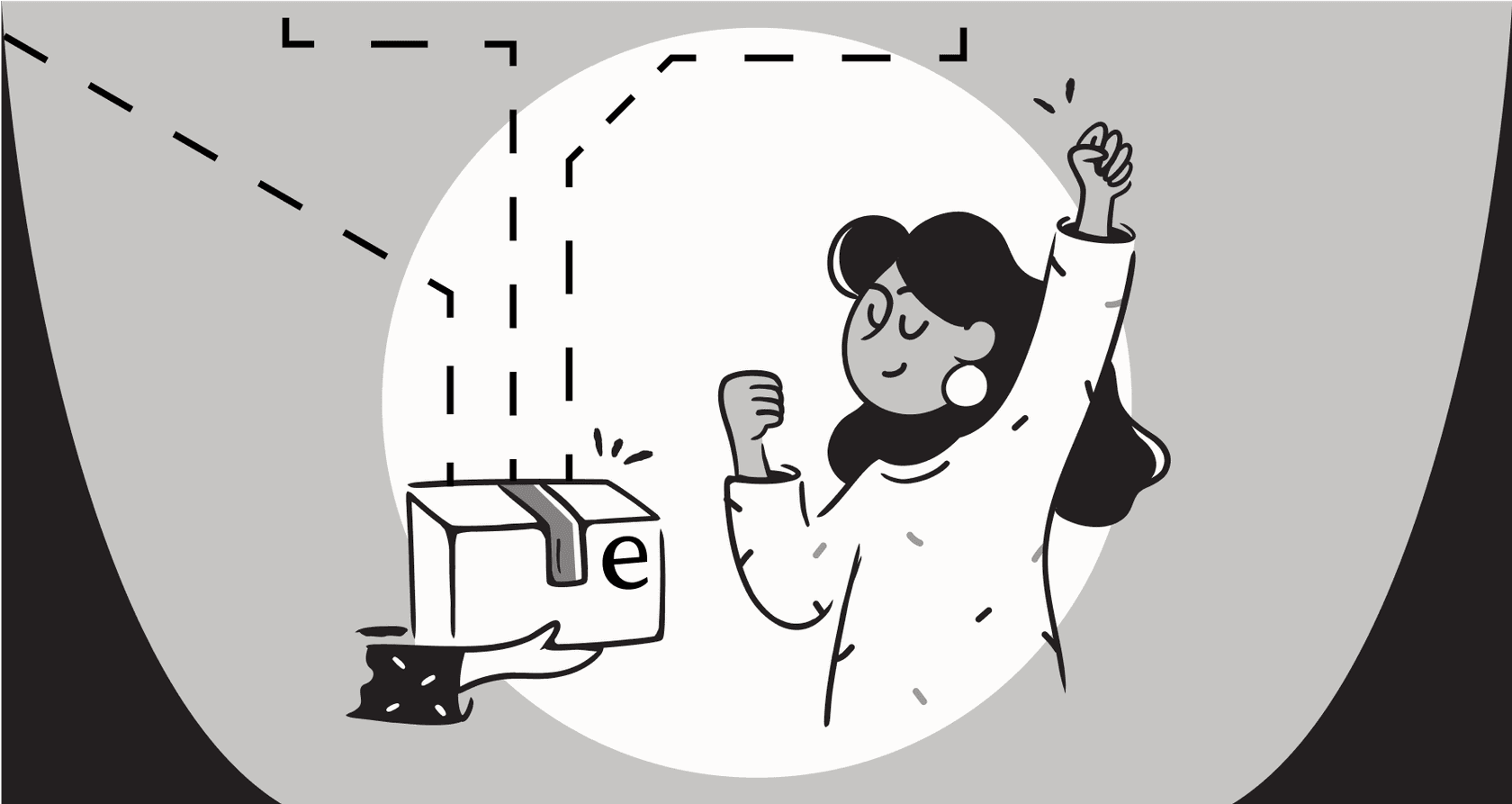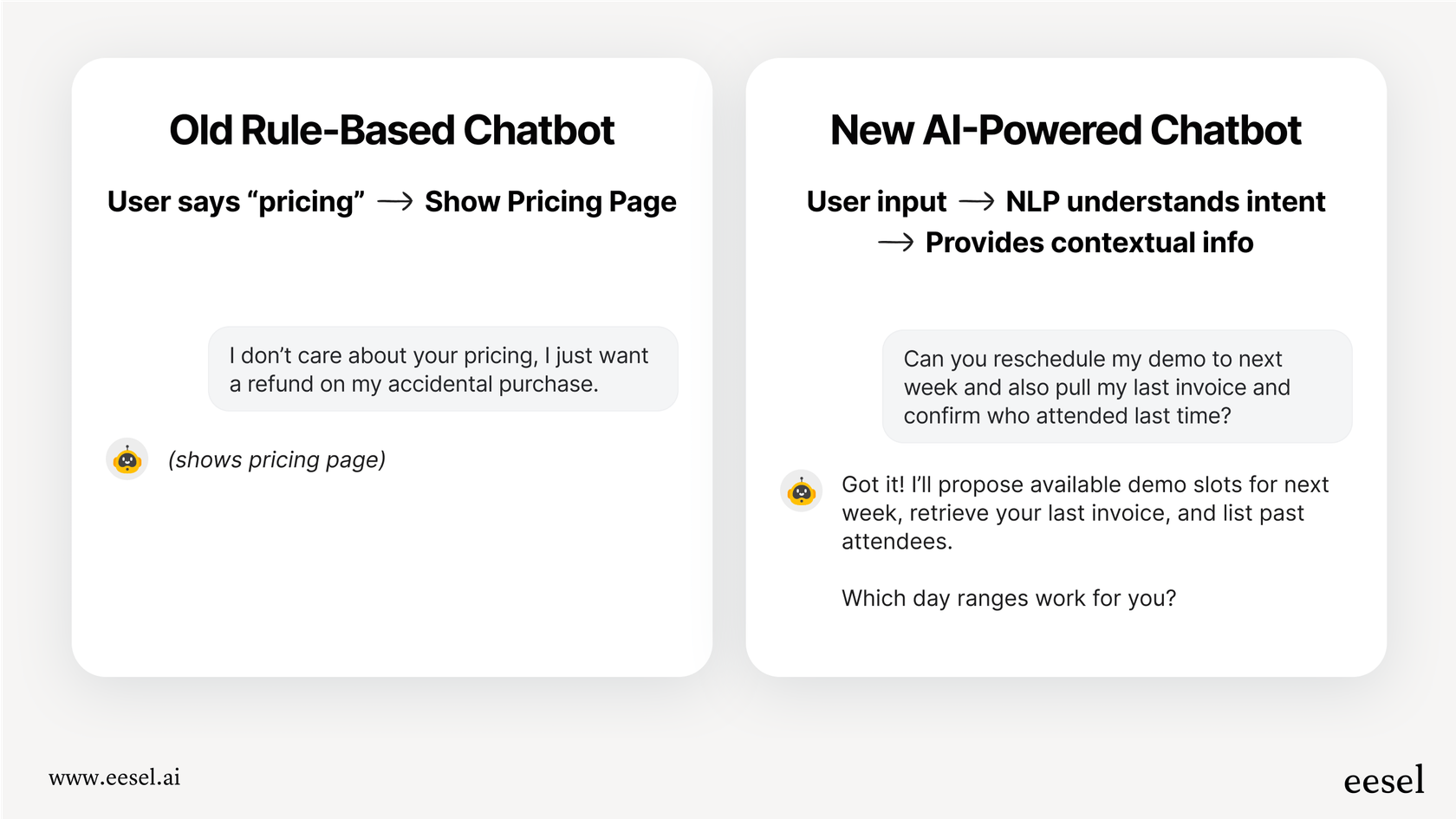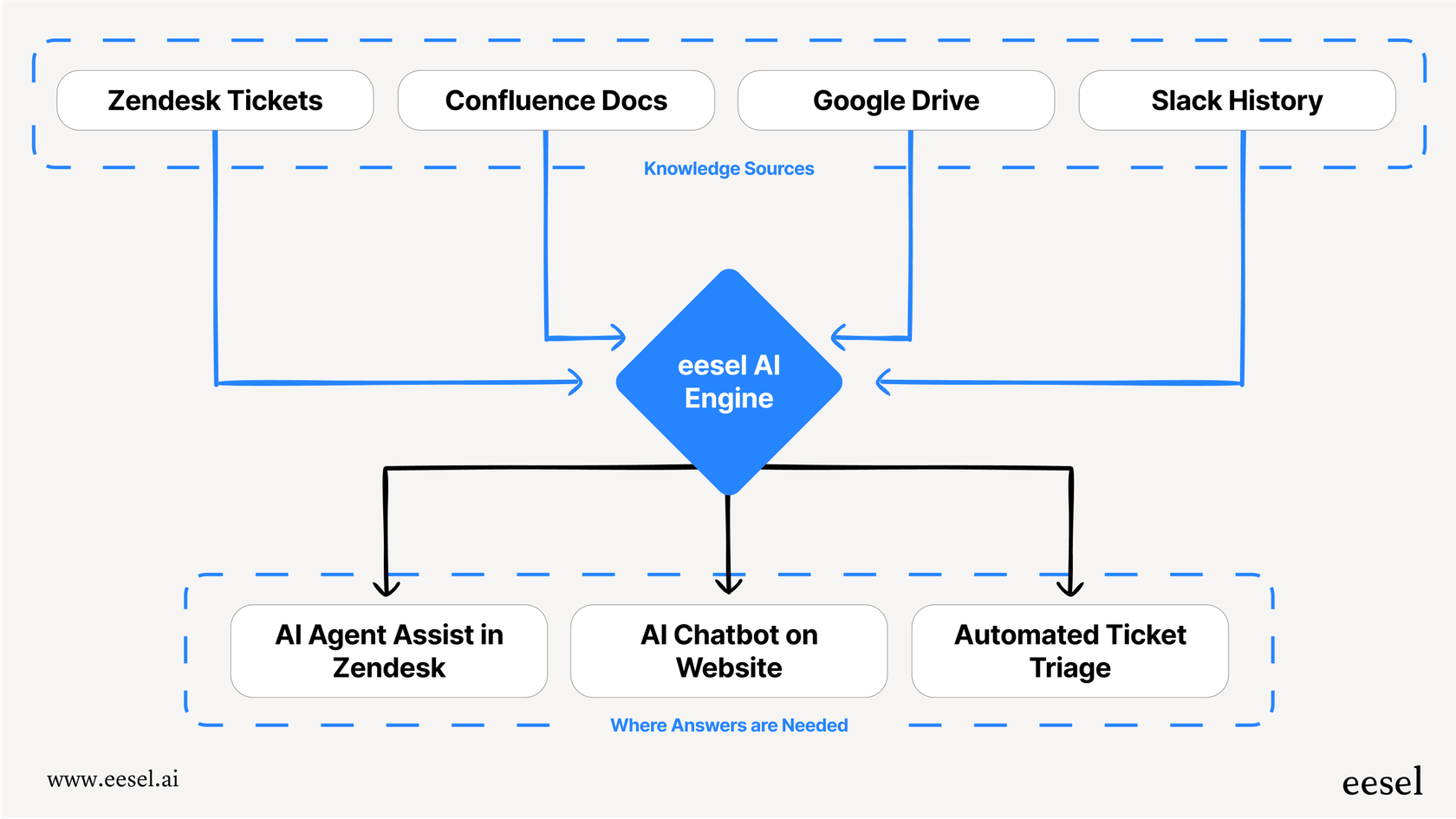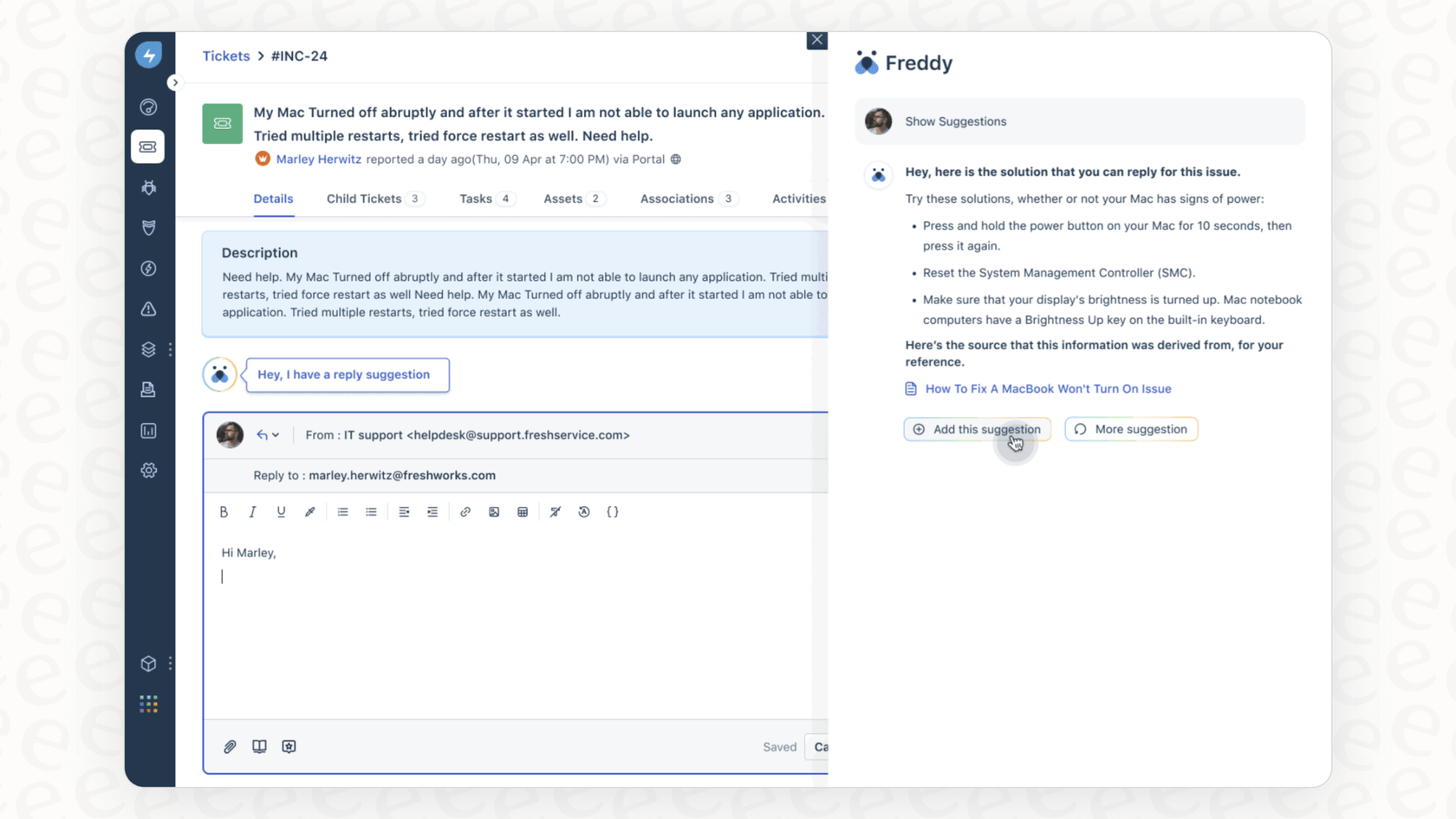
Let's be real, most support teams are swamped. The ticket queue is a never-ending flood of the same old questions, agents are teetering on the edge of burnout, and customers are left waiting for answers to simple problems. It's a frustrating cycle that chews up time and torpedoes customer satisfaction.
What if you could actually break that cycle? That's the promise of AI powered ticketing. And no, it's not just another tech buzzword. It’s a real-deal solution that handles the grunt work, frees up your team to tackle the tricky stuff, and gets your customers the quick, correct answers they're looking for.
In this guide, we'll cut through the noise and talk about what you actually need to know about AI powered ticketing systems in 2025. We'll break down what these systems are, what key pieces make them tick, the unexpected hurdles you might face, and how to navigate the confusing world of pricing.
What is AI powered ticketing?
At its heart, an AI powered ticketing system uses artificial intelligence to automate how customer support requests are managed. Think of it as a major upgrade from the old-school, rule-based automation most of us have seen before.
Those older systems run on simple "if this, then that" rules. You know the type: if a ticket has the word "refund," it automatically goes to the billing team. It’s better than nothing, but it's not very smart. It can't tell the difference between "I want my money back!" and "What's your refund policy?"
An AI powered ticketing system is much sharper. It actually understands what the customer means, not just what they type. It can figure out if they're happy or about to blow a gasket, and it gets the full story behind their problem. The point isn't just to route tickets faster; it's about solving problems intelligently, giving your human agents a helping hand, and spotting trends that can make your whole support process better.

The core components of modern AI powered ticketing
Look, not all AI ticketing systems are the same. A lot of platforms are slapping an "AI" label on their product these days, but the ones that actually make a difference have three key components working together. If you're shopping around, you'll want to make sure any tool you consider gets these basics right.
Intelligent ticket triage and resolution
First off, a good AI ticketing system has to be great at sorting and routing new tickets. As soon as a request comes in, the AI should be able to figure out what it's about, how urgent it is, how the customer is feeling, and who on your team is the best person to handle it. This process is often called Intelligent ticket triage.
The catch? A lot of platforms are surprisingly rigid. They often force you into an all-or-nothing setup where you either automate everything or nothing, with no middle ground. That's a huge pain when all you want to do is automate the easy, repetitive questions and make sure the really tricky stuff still gets to a human.
What you really want is a system that gives you control. For example, eesel AI lets you build an AI agent that only tackles your basic Tier 1 stuff, like password resets. Anything more complicated automatically gets passed to a person. This way, you can start small, see how it goes, and roll out more automation when you're ready.

Agent assistance (Copilots)
AI isn't just for full automation; it can also be a "copilot" for your support agents. Think of it as an assistant that drafts accurate, on-brand replies in seconds. It’s a huge time-saver that helps your veteran agents fly through tickets and gets new hires contributing confidently way sooner.
But here's where things can go wrong. A lot of these copilots are trained on generic public info or force you to spend ages manually creating canned responses. The result is often clunky, robotic suggestions that don't quite fit what your business is about.
The secret sauce is an AI trained on your company's actual history. The Copilot from eesel AI, for instance, learns directly from thousands of your team's past support conversations. It picks up on your specific tone, voice, and how you solve problems, so the replies it suggests sound like they came from one of your own team members, right from the start.
eesel AI Copilot providing agent assistance for AI powered ticketing.
Unified knowledge sources
An AI is only as smart as the information you give it. You know the old saying: "garbage in, garbage out." If your AI ticketing system can only pull from your public help center, it's not going to be very helpful with real-world customer problems.
This is a big weakness for a lot of built-in helpdesk AI. Tools from platforms like Zendesk or Freshdesk often can't see past the information stored inside their own walls. But let's be honest, your company's most useful info is probably scattered all over the place, in internal wikis, random Google Docs, and project management boards.
A great system tears down those walls. Take eesel AI, which connects to over 100 different apps. You can plug it into your helpdesk, sure, but you can also feed it information from internal wikis like Confluence and Google Docs, and even pull context from your team's Slack chats. This brings everything together into one brain, so the AI can give complete, accurate answers based on how your whole business operates, not just what's in your public FAQ.

The hidden challenge of AI powered ticketing: Implementation and rollout
All the promises of AI sound great, but they can fall flat if the setup process is a nightmare. This is one of the biggest headaches that people don't talk about enough when it comes to adopting a new tool.
The old way: Lengthy sales cycles and developer-heavy setup
We’ve all suffered through the old-school enterprise software song and dance. It starts with a demo you're forced to sit through, then a bunch of sales calls. After you finally sign the contract, you're stuck with a months-long setup that needs a developer just to get the basic integrations working.
And the kicker? After all that time and money, you have no real proof it's going to work like they said it would. You're just crossing your fingers and hoping for the best, because you’re already on the hook for a long-term contract.
The new way: Self-serve setup and risk-free simulation
Thankfully, some newer tools are flipping the script with a self-serve approach. You should be able to sign up, connect your helpdesk, and start building your AI agent yourself, all in a matter of minutes, not months.
This is where something like the simulation mode in eesel AI really shines. Instead of just hoping the AI does its job, you can test it on thousands of your real past tickets in a totally safe environment. The simulation shows you exactly how the AI would have handled each ticket, predicts your automation rate down to the percentage point, and lets you tweak its performance before it ever goes live. It takes all the guesswork and risk out of the equation, so you can launch your new AI feeling confident.

Understanding AI powered ticketing pricing models
AI pricing can be a total minefield. A lot of companies use confusing or unpredictable models that make it nearly impossible to figure out your budget or what you're actually getting for your money.
The problem with per-resolution and per-agent fees
A popular model you'll see is charging per AI resolution. It sounds fair on the surface, you only pay when it works, right? But if you think it through, this model actually punishes you for doing well. The better your automation gets and the more tickets it solves, the more you pay. It's a strange setup where your vendor makes more money the more you lean on them.
Other companies bundle AI features as pricey, per-agent add-ons.
-
With Zendesk, for example, you often need to be on a pricier plan (like Suite Professional at $115/agent/month) and then tack on their "Advanced AI" package for another $50/agent/month.
-
Freshdesk does something similar, selling its "Freddy AI Copilot" for $29/agent/month and then charging you again for "Freddy AI Agent" sessions at $100 for every 1,000 conversations. It ends up being a lot of different charges to keep track of.

A better alternative: Transparent, predictable plans
A much saner and more straightforward way to go is a flat-fee model. You pay a predictable price based on the features you need and get a big bucket of AI interactions to use. You get all the tools, and you don't get penalized for using them effectively.
That's the approach we take with eesel AI's pricing, because it's predictable and fair. Here’s a quick side-by-side look:
| Feature | Per-Resolution Models (Most Competitors) | Per-Agent Add-ons (Zendesk, Freshdesk) | Flat-Fee Plans (eesel AI) |
|---|---|---|---|
| Cost Predictability | ? Low (Bill scales with usage) | ? Medium (Agent count + add-ons) | ? High (Fixed monthly cost) |
| Incentives | Punishes high automation rates | Can be expensive for large teams | Encourages maximizing AI value |
| Simplicity | ? Complex (Multiple variables) | ? Complex (Tier + multiple add-ons) | ? Simple (One price for all features) |
| Flexibility | Often requires long-term contracts | Often requires annual contracts | Monthly plans available |
At the end of the day, a predictable price means you can actually figure out your ROI and grow your support team without dreading a surprise bill every month.
This video explains how AI-driven workflows can accelerate ticket resolution and create a more unified support experience.## Making AI powered ticketing work for you
AI powered ticketing isn't just a passing trend, it's changing how great customer support gets done. But as we've covered, not all systems are created equal. Getting it right means picking a platform that was actually built for how modern support teams work.
The right tool should be easy to set up, give you the final say on what gets automated, pull together all your company's scattered knowledge, let you test it out with zero risk, and have simple, predictable pricing. It shouldn't make you start from scratch, it should plug into the tools you already use and make them better.
Want to see what a modern AI platform can actually do for your team? You can sign up and get your first AI agent running with eesel AI in just a few minutes.
Frequently asked questions
Traditional automation relies on rigid "if-then" rules, only understanding keywords. AI powered ticketing, however, uses intelligence to understand the customer's intent and context, enabling it to solve problems more intelligently and route tickets with greater accuracy. It's a significant upgrade in understanding and problem-solving capability.
AI powered ticketing assists human agents by acting as a "copilot," drafting accurate and on-brand replies in seconds. It frees them from repetitive tasks, allows them to focus on complex issues, and helps new hires contribute confidently by providing intelligent suggestions.
Effective AI powered ticketing systems unify knowledge from various sources, not just public help centers. They can connect to internal wikis, Google Docs, Slack channels, and historical support conversations to provide comprehensive and accurate answers tailored to your company's operations.
Traditionally, implementing AI powered ticketing could involve lengthy sales cycles and developer-heavy setups. However, modern tools increasingly offer self-serve setups and simulation modes, allowing teams to integrate and test the AI within minutes, reducing risk and time investment significantly.
Modern AI powered ticketing systems provide control by allowing you to define automation boundaries. For instance, you can set an AI to handle only Tier 1 issues like password resets, ensuring that more complex or sensitive queries are automatically escalated to a human agent, giving you full oversight.
When evaluating AI powered ticketing pricing, look out for models that charge per resolution or per agent add-on, as these can become unpredictable and costly. Transparent, flat-fee plans that offer a predictable monthly cost and encourage maximizing AI usage are generally more advantageous and easier to budget for.
While AI powered ticketing excels at resolving common, repetitive queries quickly, it's also designed to understand complexity. For unique or highly intricate issues, the AI can intelligently triage and route them to the most appropriate human agent, often providing agents with relevant context or suggested answers to speed up resolution.
Share this post

Article by
Stevia Putri
Stevia Putri is a marketing generalist at eesel AI, where she helps turn powerful AI tools into stories that resonate. She’s driven by curiosity, clarity, and the human side of technology.







